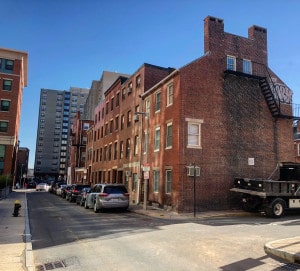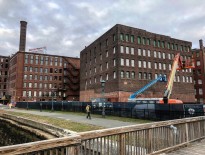
Rising demand for short-term rentals is filling former apartments in neighborhoods such as Boston’s Chinatown, where investors have acquired multifamily properties to cater to visiting businesspeople and tourists.
Concerns about displacement, rising housing costs and an influx of transient residents are not out of the ordinary for Boston’s Chinatown, given the recent construction of luxury high-rises and boutique hotels.
One of downtown’s last pockets of relative affordability, Chinatown is now feeling the effects of the largely unregulated short-term rental market. Airbnb and similar platforms are evolving, as investors acquire and rent out multiple units in apartment and condominium buildings at the higher rates that short-term rentals typically fetch.
Karen Chen, executive director of the Boston-based Chinese Progressive Association, said more than 100 apartments in the neighborhood are typically listed on Airbnb and related sites. The agency has provided relocation assistance to more than 25 families who were displaced after their buildings were sold, she said.
“In a small neighborhood like Chinatown, when you turn a whole building into a short-term rentals, it’s really pushing out people who need the services in Chinatown for survival,” Chen said.
Chen rattled off a list of rowhouses and apartment buildings in the neighborhood that have been acquired by investors in the past two years, then converted into short-term rentals typically quoting prices over $100 per night.
That’s a discount for travelers compared to downtown Boston’s pricey hotels, but a sticking point for housing and neighborhood activists who say it’s time for the city and state to referee the industry. While cities across the country and as close as Cambridge and Somerville move to regulate short-term rentals, Boston has let the industry expand without new regulation. A June 2014 memo by Inspectional Services Commissioner William Christopher Jr. stated the city will not enforce potential zoning violations by short-term rentals as long as the unit is owner-occupied, while the city studies existing and future regulations.
After a study of registration requirements in cities from Paris to New Orleans, Boston Mayor Marty Walsh is expected to file legislation with the new city council in the first half of 2018, said Chris English, the administration’s policy analyst for special initiatives. Some cities require online platforms to report to them directly on such details as the number of days a unit is used as a short-term rental.
“Registration is obviously a key factor in this,” English said. “Monitoring the use of residential units as short-term rentals can only be done if you’re able to count the number of days the units are used.”
Many Players In ‘A Complicated Sector’
A framework could emerge in early 2018. State legislators are expected to take up a bill by state Rep. Aaron Michlewitz, D-Boston, which would require registration and a three-tiered tax on short-term rentals.
The bill divides hosts into three categories based upon the number of units they own and length of stay, with a state excise tax ranging from 4 percent to 8 percent. Local communities would have an option to impose their own tax ranging from 5 percent to 10 percent. They also could limit hosts to only renting out their primary residences, and cap the number of days per year that a united can be rented.
“It’s a good structure,” said Ford Cavallari, a North End resident and chairman of the Boston-based Alliance of Downtown Civic Organizations. “Some people complain that it’s complicated. This is a complicated sector and there are many different players here.”
While the city of Boston does not require short-term rentals to be registered, activists have compiled recent data from online listings indicating category has grown dramatically.
An August study by University of Massachusetts-Boston economics professors Keren Horn and Mark Merante found approximately 4,800 short-term rentals listed in Boston as of September. Earlier surveys by Boston-based nonprofit Community Labor United found 3,459 listings in July 2016 and 2,048 in July 2015.
The total number of available units appears to be rising, and so does the number of owners marketing multiple units in one or more buildings.
The CLU survey found 47 percent of owners listing multiple properties in 2016. And a March 2017 study by brokerage CBRE concluded that hosts who own 10 or more units earned more than a third of all multi-unit Airbnb hosts’ revenues in the Boston metropolitan statistical area.
The CBRE report pegged annual Airbnb revenues locally at $126 million and estimated the industry could generate up to $16 million in tax revenues, based upon a 14 percent combined local and state tax rate.
Growth Tied To Rent Increases
For Julius Sokol, renting out a Chinatown three-family rowhouse to visiting businesspeople is a way to maintain a stream of income while preparing to renovate the building as apartments.
Sokol’s JB Capital acquired 29 Oak St. in June 2015 for $1.26 million and leased the building to an undisclosed corporate rental provider, which rents out the three units. The property is assessed at $657,500.
“Rather than moving in families that I’d have to displace, we figured we’d rent it to a corporate guy,” Sokol said. He said no families were displaced by the acquisition, and supports the idea of registering and taxing such properties.
“If they’re going to allow people to make money on short-term rentals, which there’s obviously a market for, why not?” he said.
Echoing a debate over the growth of the corporate rental market in the Boston multifamily market, affordable housing advocates say the industry is driving up rents. The UMass-Boston study concluded that a high concentration of Airbnb units in a neighborhood is correlated with an average rent increase of 3.1 percent, or $93 a month.
Neighborhood activists also say Airbnb’s tend to generate excessive noise, trash and potential security issues, while eroding neighborhood stability.
“We’re losing the neighborhood feel in certain areas when you walk down a block in Chinatown and now it’s all people rolling up with suitcases after they got off an Uber from Logan,” Cavallari said. “It used to be families.”








